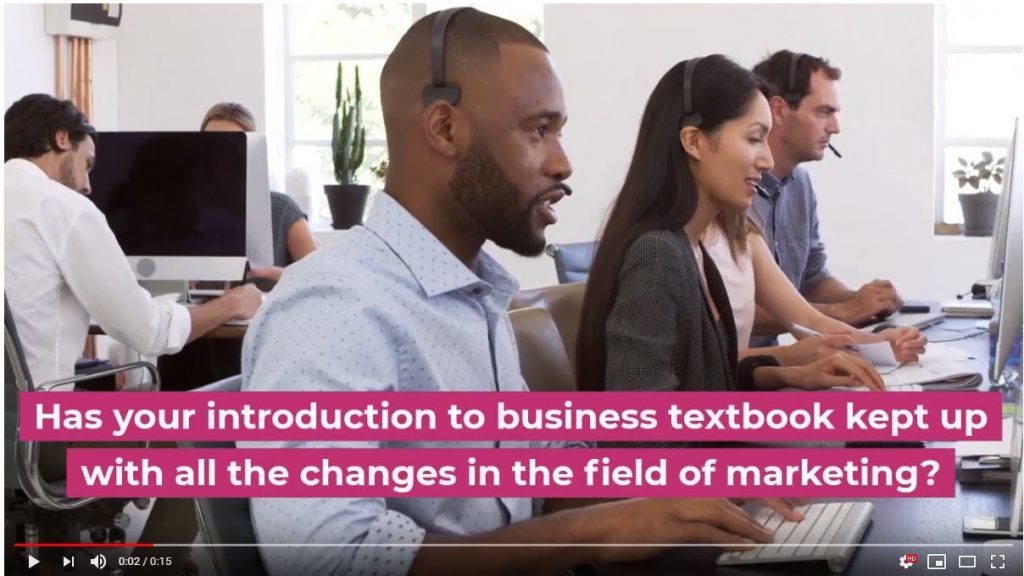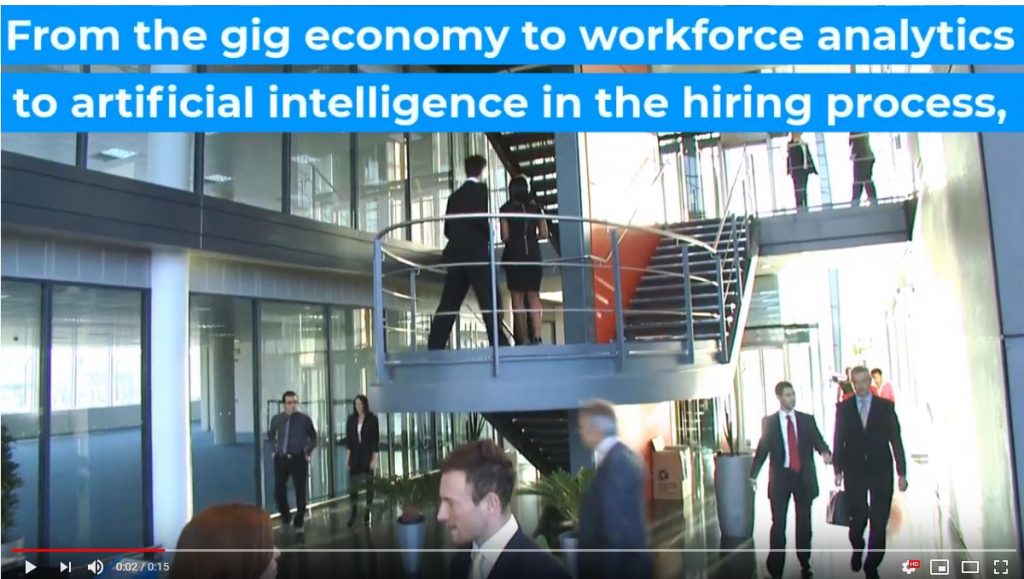 "We took a look at how American work habits have changed over the past 10 years. Here are some of the most prominent examples."
"We took a look at how American work habits have changed over the past 10 years. Here are some of the most prominent examples."
Teaching Introduction to Business: The Crisis in Business Ethics and Public Confidence
Business in Action, 7th Edition, offers instructors and students a much-needed alternative to texts that either overload students with distracting features and excessive detail or underserve them by making compromises on essential coverage. Business in Action is up to 20 percent shorter than other comprehensive texts, setting the standard in high-productivity learning.
The First Introduction to Business Textbook That Prepares Students for the Digital Transformation and Artificial Intelligence
Instructors: Order an examination copy of this text.
Is your textbook keeping up with the changes sweeping through the business world?
If you teach introduction to business, you know how quickly the world of business is changing, with industry after industry being reshaped by digital systems and artificial intelligence.
The question is: Does your textbook reflect this revolution?
Unless it has already embraced these new concepts discussed in this video, chances are it is preparing students for yesterday’s business world, not tomorrow’s.
Every Enterprise Is Now a Digital Enterprise
The business world is experiencing waves of technological and social disruptions that are reshaping what it’s like to launch, lead, and work for companies. Consider this stunning change: In a 2015 survey, fewer than 1 percent of executives believed digital technology would disrupt their industries.
Only two years later, more than 75% said digital would have a “major” or “transformative” impact on their industries. In a fundamental way, virtually all businesses are becoming digital enterprises, regardless of what they produce, because digital systems are essential to how they create value and connect with customers. And this digital transformation is affecting every aspect of business, from HR to finance to marketing.
The Exciting—and Unsettling—Prospect of Digital Transformation
Students need to be ready for this new world of business for two key reasons. First, executives who are scrambling to implement their own digital transformations are looking for employees who are tuned into these concepts and technologies.
Second, students can’t afford to set their sights on traditional career paths without understanding how those career paths are changing—or in some cases, disappearing. Many of today’s jobs are vulnerable to disruption from artificial intelligence and related technologies, and many graduates will be working in jobs we can’t even envision today.
Preparing Students to Thrive in the Digital Enterprise
Clearly, the business curriculum needs to prepare students for a vastly different world of work—while still helping them grasp the core principles of business. The new Ninth Edition of Business in Action tackles this challenge with a unique approach called Thriving in the Digital Enterprise.
Each chapter features six structured learning objectives devoted to the important principles of that topic, followed by a new, seventh section that features one key aspect of thriving in the digital enterprise. These new sections offer concise, non-technical explanations of disruptive business technologies that are likely to affect students’ careers in the coming years.
Today’s Students Are Looking for Business with a Higher Purpose
The changes sweeping through business today are about more than just technology, however. For example, today’s younger workers show a keen interest in finding or creating work that involves a more meaningful purpose than simply making a paycheck.
Business in Action explains the ways that many companies are moving beyond the concept of corporate social responsibility to become purpose-driven companies. It helps students understand the challenges of moving beyond the bottom line, and shows them how companies can do well by managing business as a force for good.
Exhibits That Teach: Visual Learning for Today’s Students
It’s no secret that information habits are changing and that today’s learners value alternatives to lengthy written accounts. Business in Action supports these learners with high-efficiency visual learning. The Ninth Edition features nearly 150 exhibits that teach—diagrams, graphs, quick-reference tables, and other exhibits that address the challenge of getting students to read long passages of text by presenting vital concepts visually.
The emphasis throughout is on productive learning by helping students minimize the time they spend reading while maximizing their learning outcomes.
Other Highlights of the Ninth Edition
The Ninth Edition is one of the most comprehensive revisions in the long history of Business in Action, making it more concise and more effective than ever.
Streamlined coverage
New learning and career-development features
Growing as a Professional encourages students to apply the business concepts they are learning in each chapter to facets of their academic and personal lives right now.
Resolving Ethical Dilemmas challenge students with realistic ethical dilemmas that require thoughtful analysis and decision-making.
Intelligent Business Technology helps students grasp the benefits of the smart systems that their future employers are likely to be using.
Extensive content enhancements
The Behind the Scenes chapter-opening vignettes and end-of-chapter case studies show students how professionals apply the same skills and concepts they are reading about in the chapter. All 16 vignette/case study pairs are new in this edition.
Every chapter has fresh project ideas and evaluation questions, with a total of more than 275 new questions and student activities.
Well over a hundred individual sections have been added, updated, or extensively revised throughout the 16 chapters.
The Benefits of Not Marketing to Certain Customers

"How many CMOs would choose to woo a segment that will absolutely never change buying behaviors regardless of what type of marketing they receive? Wouldn’t it make more sense to only focus on those customers who act on targeted campaigns?"
5 Tips for Building Culture in a Remote Workplace

"Growing an effective culture within a remote workforce requires a clear vision of the changes you wish to see across the organization, employees who meet that vision, a commitment to perpetuating the company vision and culture, and a strong leader who embodies that culture."
Does Your Introduction to Business Text Reflect the Latest Marketing Practices?
For more information, visit https://introtobusiness.businesscommu…
Has your introduction to business textbook kept up with all of the changes in the field of marketing? You'll find coverge of customer experience touchpoints, voice of the customer programs, social customer care, innovative pricing methods, and other vital new concepts in Business in Action, 9th Edition.
Thriving in the Digital Enterprise: The Ethics of Artificial Intelligence
 As one of the most powerful technologies ever developed, artificial intelligence (AI) is already influencing human life in multiple ways and promises to do so even more in the future. Although many of these developments are positive, AI shares the two-sided nature of every major technology: The power that enables it to be a positive force can also gives it the potential to become a negative force. Moreover, even with good intentions, it is impossible to foresee and control all the consequences that AI could unleash.
As one of the most powerful technologies ever developed, artificial intelligence (AI) is already influencing human life in multiple ways and promises to do so even more in the future. Although many of these developments are positive, AI shares the two-sided nature of every major technology: The power that enables it to be a positive force can also gives it the potential to become a negative force. Moreover, even with good intentions, it is impossible to foresee and control all the consequences that AI could unleash.
Two issues of particular concern from an ethical perspective are embedded biases and a lack of transparency and accountability.
Human Biases Embedded in AI Systems
Like all human creations, AI reflects the intentions and beliefs of its creators—sometimes consciously and sometimes subconsciously. Simplifying greatly, AI systems incorporate algorithms, or instructions, and data that those instructions operate upon. If either the algorithms or the data reflect human biases, the AI system will likely exhibit those same biases.
For instance, facial recognition systems, which are increasingly being used for security and identification purposes, are “trained” using large collections of photographs. What they learn depends to a large degree on the photos in those collections. When African American AI researcher Joy Buolamwini (see photo) discovered that some of the most widely used facial recognition systems had much higher error rates on female and nonwhite faces, she traced the problem to the photo sets they were trained on, which were composed of mostly white, male faces. The only way she could get some of the systems to recognize her face as a face at all was to wear a white mask.
The developers of these systems are making improvements, but the fact that the problems existed in the first place could reflect a lack of diversity in AI research. As Buolamwini put it, “You can’t have ethical AI that’s not inclusive. And whoever is creating the technology is setting the standards.”
Another area in which AI systems can exhibit bias is language processing, because they learn from human language usage, which can have patterns of bias that range from overt to deeply buried. For instance, in a test where otherwise identical résumés were presented to some employers displaying a European American name and to other employers displaying an African American name, the résumé with the European American name drew 50 percent more interview invitations. If AI systems take on biased behaviors from language usage, their ability to automate decision-making at lightning speed can propagate biases throughout business and society as a whole.
Other areas where AI systems can potentially exhibit bias include risk-assessment systems that purport to predict an individual’s likelihood of committing a crime and automated applicant-evaluation systems used to make lending and hiring decisions. However, these automated approaches have the potential to be less biased than human decision makers if they are programmed to focus on objective factors. In an important sense, we don’t want AI that can think like humans; we want AI that can think better than humans do.
Lack of Transparency and Accountability
One of the most unnerving aspects of some advanced decision-making systems is the inability of even their creators—much less the general public—to understand why the systems make some of the decisions they do. For example, an AI system called Deep Patient is uncannily effective at predicting diseases by studying patients’ medical data. In some instances, doctors don’t know how it reached its decisions, and the system can’t tell them, either.
This lack of insight has troubling implications for law enforcement, medicine, hiring, and just about any other field where AI might be used. For instance, if a risk-assessment system says that a prisoner is likely to reoffend and therefore shouldn’t be paroled, should the prisoner’s lawyers be able to cross-examine the AI? What if even the AI system can’t explain how it reached that decision?
The Efforts to Make AI a Force for Good
AI unquestionably has the potential to benefit humankind in many ways, but only if it is directed toward beneficial applications and applied in ethical ways. How can society make sure that the decisions made and the actions taken by AI systems reflect the values and priorities of the people who are affected? How can we ensure that people retain individual dignity and autonomy even as intelligent systems take over many tasks and decisions? And how can we make sure that the benefits of AI aren’t limited to those who have access to the science and technology behind it? For example, a high percentage of the available AI talent is currently concentrated in a handful of huge tech companies that have the money necessary to buy up promising AI start-ups. While this benefits Google, Amazon, and Facebook in their business pursuits, potential applications in other industries, agriculture, medicine, and other fields might be lagging behind for want of talent.
Recognizing how important it is to get out in front of these questions before the technology outpaces our ability to control it, a number of organizations are wrestling with these issues. One of the largest is the Partnership on AI, whose membership includes many of the major corporate players in AI and dozens of smaller companies, research centers, and advocacy organizations. Its areas of focus include ensuring the integrity of safety-critical AI in transportation and health care; making AI fair, transparent, and accountable; minimizing the disruptive effect of AI on the workforce; and collaborating with a wide range of organizations to maximize the social benefits of AI.
Individual companies are also helping in significant ways. Microsoft, for instance, is directing millions of dollars and some of its considerable AI talent to AI for Earth, a program that uses AI to improve outcomes in agriculture, water resources, education, and other important areas.
The spread of AI throughout business highlights the importance of ethical awareness and ethical decision-making. Only by building ethical principles into these systems can we expect them to generate ethically acceptable outputs.
Adapted from Courtland L. Bovée and John V. Thill, Business in Action, 9th ed (Pearson: 2020), 110–112.
Teaching Your Introduction to Business Students about Innovations in Workforce Management
Learn more by visiting https://introtobusiness.businesscommu….
From the gig economy to workforce analytics to artificial intelligence in the hiring process, human resource management is undergoing some radical changes. Make sure your course stays on top of these developments with Business in Action, 9th Edition, by Bovee and Thill (Pearson).
From Taskmaster to Leader: Learn the 4 Ways to Drive Results Through Relationships

"It’s easy for leaders to become a little too focused on the task at hand. They’re rushing from meeting to meeting, solving problems and reporting on deliverables, trying to be efficient and make sure everyone stays on task," writes Joel Garfinkle (photo, left) in an article at Smart Brief.
"Sometimes, in that strive towards efficiency, the human connection with the team can be lost.
"Does it matter? If responsibilities are getting done and everyone knows what they’re supposed to do, what’s the difference? If the only interactions you have with employees is to assign tasks or get status updates, you may be missing out opportunities to build positive work relationships and take your team to the next level. If you want to build relationships instead of just have interactions, read on about how taking just a little time can be the key to getting ahead."
Teaching Introduction to Business: The Crisis in Business Ethics and Public Confidence
Business in Action, 7th Edition, offers instructors and students a much-needed alternative to texts that either overload students with distracting features and excessive detail or underserve them by making compromises on essential coverage. Business in Action is up to 20 percent shorter than other comprehensive texts, setting the standard in high-productivity learning.


